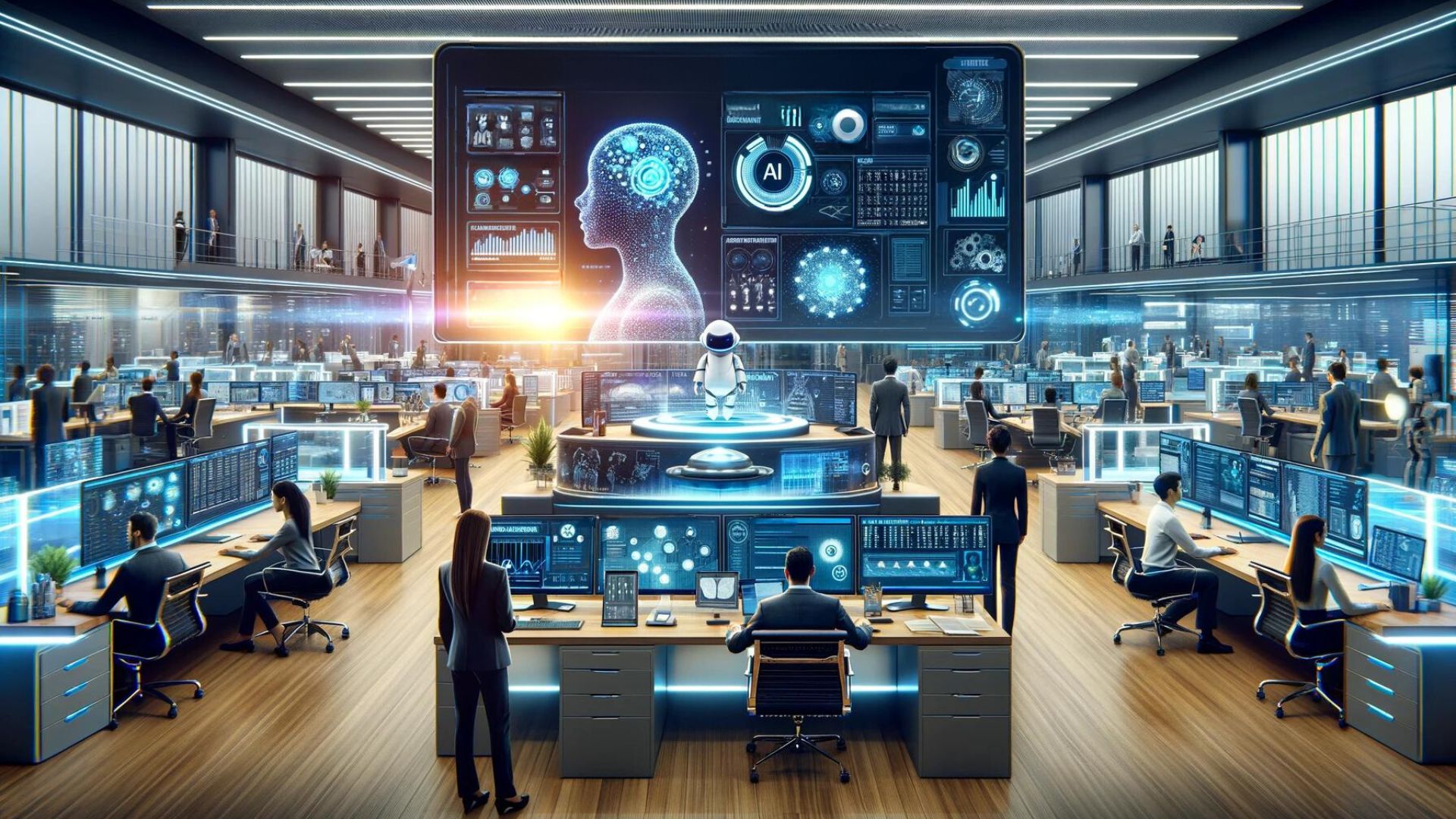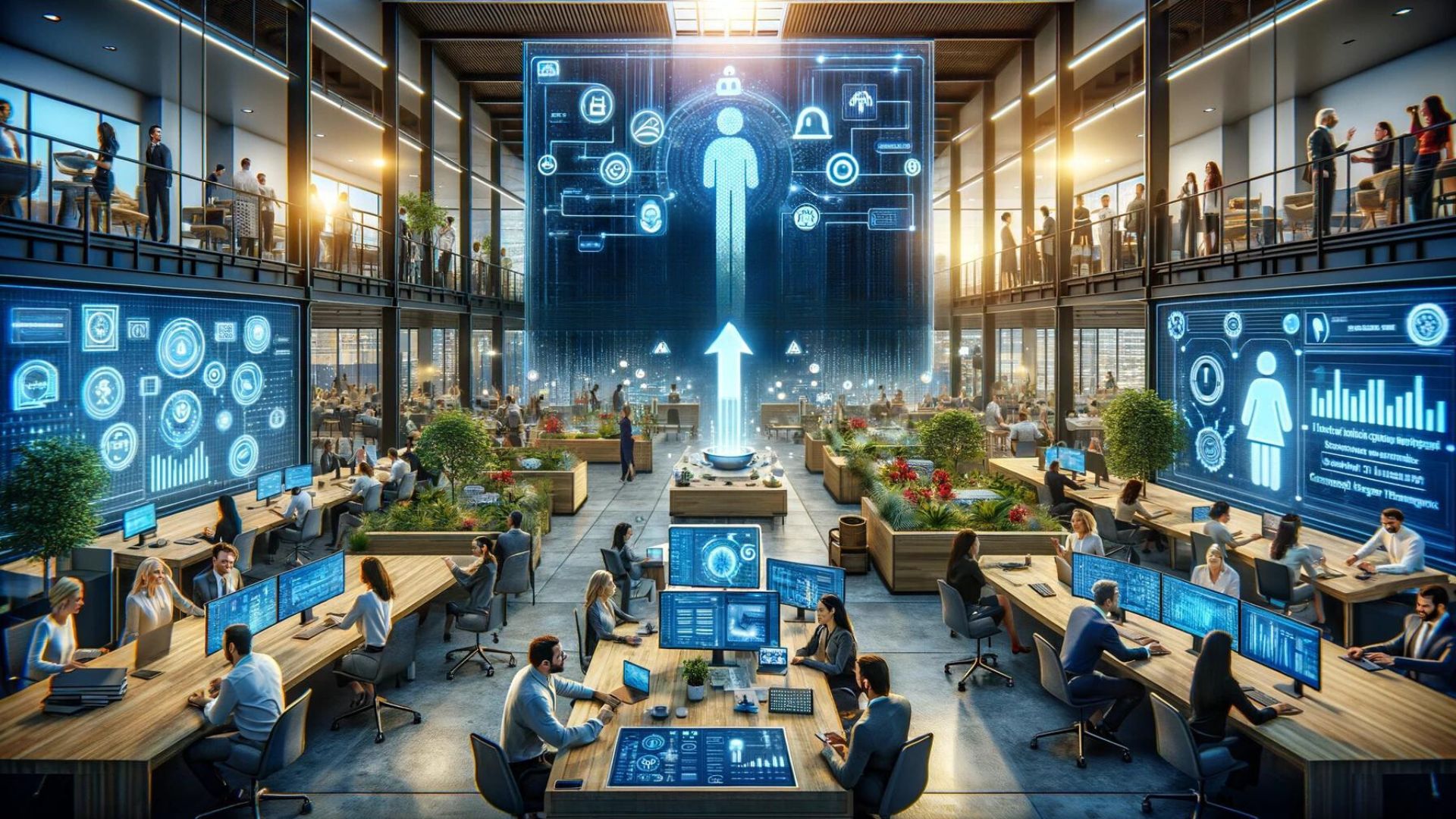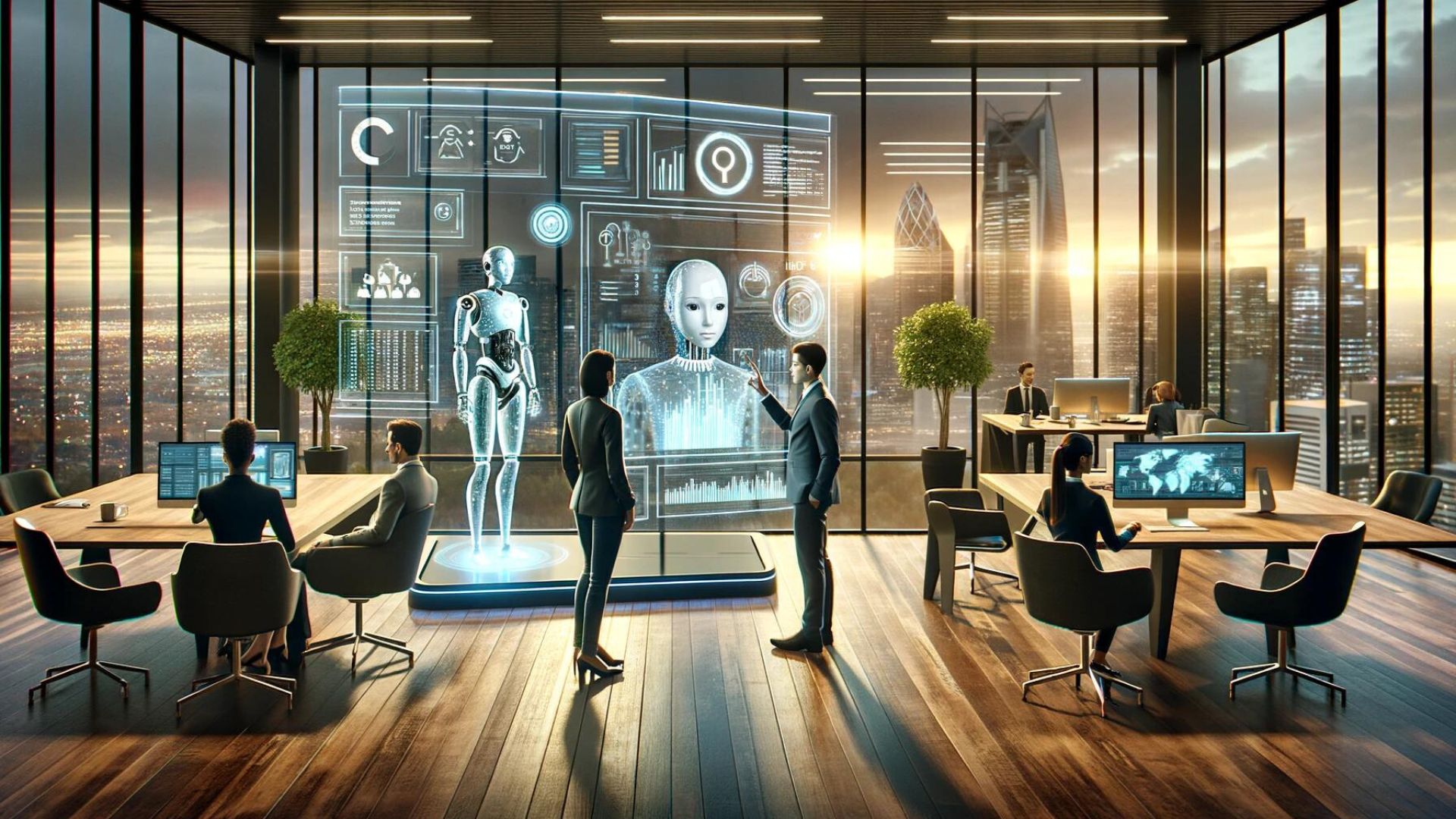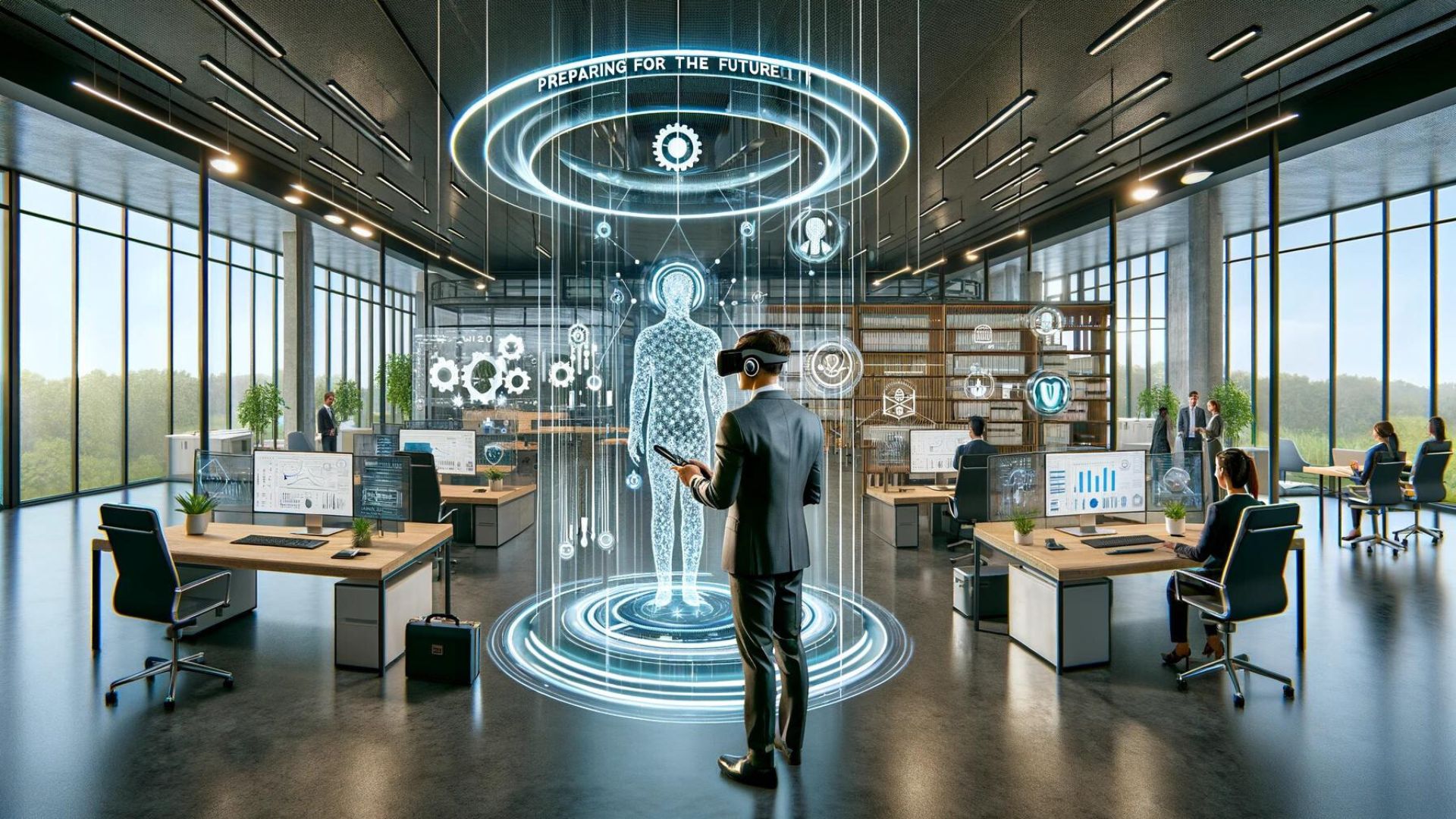Exploring the intricate world of Human Resource management presents a significant challenge, particularly for small and medium-sized enterprises (SMEs) striving to keep top talent and streamline HR operations. This is where adaptive AI HRMS features become crucial. Designed as a cloud-based solution, Adaptive AI HRMS addresses HR hurdles head-on. Its broad range of functionalities includes automation of employee onboarding, management of wellness programs, leaves, claims, and performance evaluations. The platform’s straightforward interface ensures efficiency, and its customizable adaptive AI HRMS features allow for flexibility to accommodate specific business requirements. Continually updated with new capabilities, Adaptive AI HRMS is on a mission to redefine SMEs’ approach to HR management and to provide an economically viable option worldwide.
Key Takeaways
- AI HRMS revolutionizes HR operations by automating mundane tasks, enhancing recruitment, and streamlining the onboarding process, leading to increased efficiency.
- By personalizing the employee experience and implementing AI-powered wellness and feedback tools, AI HRMS elevates employee engagement and satisfaction.
- Predictive analytics within AI HRMS enable data-driven strategies, improving employee retention, optimizing talent acquisition, and forecasting workforce trends.
- AI HRMS balances efficiency with empathy, maintaining the human touch in HR technology, ensuring privacy, ethical AI use, and supporting diversity and inclusion.
- The future of HR is shaped by AI integration, with trends indicating a need for adaptive HR teams, scalable solutions for SMEs, and continuous evolution with AI advancements.
Revolutionizing HR Operations with AI-Driven Automation

Streamlining Administrative Tasks
The advent of AI-driven HRMS (Human Resource Management Software) has revolutionized how administrative tasks are managed within HR departments. AI-powered automation takes charge of routine duties, transforming HR professionals from task executors to strategic partners. By handling repetitive tasks such as scheduling interviews and processing paperwork, AI enables a more efficient allocation of human resources.
Payroll and Benefits Administration has seen significant improvements with AI integration. Errors are minimized, and employees enjoy timely, accurate payments and benefits enrollment. This automation extends to performance management, where AI tools provide real-time insights and analytics, fostering a proactive approach to employee development.
AI HRMS solutions are not just about efficiency; they’re about creating a seamless, error-free environment that allows HR teams to focus on more impactful work.
Here are some of the key features that AI HRMS offers to streamline administrative tasks:
- Employee Onboarding: Customizable templates for a smooth start.
- Employee Wellness: Health programs integrated into daily routines.
- Employee Training: Orientation plans for effective role adaptation.
- Employee 360 Feedback: Instant feedback mechanisms.
- Employee Leave Application: Real-time leave management.
- Employee Claim: Automated expense claims and tracking.
- Employee Performance Review: Goal setting and feedback for growth.
- Employee Organization Chart: Auto-updated charts for clarity.
- Employee Daily Check-in Check-Out (Timesheet): Accurate time tracking for workforce management.
- Employee Equipment Record Keeping: Organized tracking of company assets.
As AI HRMS continues to evolve, it promises to establish itself as a vital tool for SMEs, ensuring that administrative tasks are no longer a bottleneck but a streamlined process driving HR efficiency.
Enhancing Recruitment Processes
Integrating AI into recruitment processes has been a game-changer for HR teams. By leveraging Applicant Tracking Systems (ATS), companies can automate the mundane aspects of hiring, such as resume screening and initial candidate assessments. This shift allows recruiters to concentrate on more strategic tasks, like building relationships with top talent and making informed hiring decisions.
AI-driven tools in recruitment not only expedite the hiring cycle but also promote fairness by reducing unconscious bias. Just Eat’s experience with personalized recruitment tools exemplifies the dual benefits of efficiency and equity.
Here’s how AI is transforming recruitment:
- Personalized candidate outreach
- Automated resume analysis
- Intelligent interview scheduling
- Data-driven candidate evaluation
- Enhanced candidate engagement
Embracing AI in recruitment aligns with the broader trend of adapting to an AI-driven world, where collaboration between humans and technology leads to greater efficiency without sacrificing the human touch. As the landscape evolves, HR professionals must continue to develop new skills and work alongside AI to maintain accurate and empathetic hiring practices.
Automating Employee Onboarding
Integrating AI into employee onboarding processes marks a significant leap towards efficiency. AI-driven HRMS platforms are now adept at handling the initial paperwork and setting up systems, ensuring a smooth transition for new hires. By analyzing individual data, these systems can offer tailored learning and development resources, aligning with the unique needs of each employee.
The goal is not just to expedite onboarding but to create a welcoming environment that fosters long-term employee retention.
However, it’s crucial to maintain a balance between automation and personal touch. While AI can streamline onboarding, it should complement rather than replace human interactions. This ensures that new employees do not feel overwhelmed by an impersonal experience.
- Employee Onboarding: Customizable profile templates and modules.
- Employee Wellness: Integration of Wellness Resources.
- Employee Training: Orientation plans for role acclimatization.
- Employee 360 Feedback: Instant feedback mechanisms.
In conclusion, AI HRMS solutions are transforming onboarding into a more engaging, personalized, and efficient process. They are setting the stage for new hires to build a connection with the company, which is essential for fostering a committed and productive workforce.
Elevating Employee Engagement through AI

Personalizing the Employee Experience
In the era of adaptive AI HRMS, personalizing the employee experience has become a cornerstone for fostering a positive workplace culture. AI-driven tools are revolutionizing the way employees interact with HR services, from recruitment to daily operations. By leveraging AI, companies can offer a more tailored approach to each individual, enhancing satisfaction and productivity.
- Personalized recruitment strategies ensure the right fit for both the role and the company culture.
- AI-powered performance management systems provide real-time feedback, aligning employee goals with organizational objectives.
- Customizable wellness programs address individual health needs, promoting a balanced work-life environment.
The integration of AI into HRMS not only streamlines processes but also significantly enriches the employee journey at every touchpoint.
With AI HRMS, businesses are equipped to handle various aspects of employee management with unprecedented precision. From employee onboarding to performance reviews, each function is designed to adapt to the unique needs of the workforce. This adaptability is crucial for small to medium-sized enterprises (SMEs) that require scalable solutions to grow alongside their evolving HR demands.
Implementing AI-Powered Wellness Programs
In the pursuit of a healthier workforce, AI-powered wellness programs are becoming integral to proactive HR strategies. AI-driven tools actively monitor well-being indicators like workload, work hours, and stress levels, providing organizations with crucial early detection of potential burnout or dissatisfaction. This enables timely interventions to maintain a healthy work-life balance for employees.
By leveraging sentiment analysis, AI can assess employee engagement through communication channels, offering insights into workforce morale and areas needing improvement. Tailored wellness initiatives can then be deployed, ensuring each employee receives support that resonates with their individual needs and preferences.
The implementation of AI in wellness programs not only demonstrates a company’s commitment to its employees’ growth and happiness but also fosters a positive workplace culture where employees feel valued and motivated. Here’s how AI HRMS features contribute to employee wellness:
- Employee Wellness: Incorporates wellness resources into comprehensive health programs.
- Sentiment Analysis: Analyzes communications to gauge employee morale.
- Personalized Interventions: Wellness programs are recommended based on individual preferences.
As AI continues to evolve, its role in enhancing employee well-being and engagement is set to become a strategic cornerstone for HR, ensuring a nurturing work environment that contributes to the organization’s success.
Facilitating 360 Feedback with AI Tools
The advent of AI in HR has transformed the traditional performance review into a dynamic, continuous process. AI-driven 360 feedback tools gather comprehensive insights from supervisors, peers, and subordinates, offering a well-rounded view of an employee’s performance. This not only highlights contributions but also pinpoints areas needing development.
Sentiment analysis and machine learning algorithms work in tandem to analyze feedback, identifying trends that predict future performance and growth opportunities. Such tools are instrumental in fostering a culture of continuous improvement, which is crucial for organizational success.
AI’s precision in performance management ensures that feedback is not just for assessment but also serves as a catalyst for professional development.
By integrating AI tools into the feedback loop, companies can expect a more engaged and well-supported workforce, leading to better retention and overall satisfaction.
Data-Driven HR Strategies with Predictive Analytics

Improving Employee Retention
The integration of AI into HRMS (Human Resource Management Systems) has ushered in a new era of employee retention strategies. By leveraging data analytics, AI tools can predict potential turnover, allowing HR professionals to intervene proactively. Regular feedback and recognition are key factors in retaining talent, and AI facilitates these processes through timely insights and automation.
AI account software automates payroll management, provides insights, ensures compliance with regulations, and offers data analysis for informed financial decision-making in small businesses.
Moreover, AI-driven HRMS features such as personalized training programs and career development plans are instrumental in fostering employee satisfaction. These initiatives not only recognize employees’ efforts but also support their professional growth, leading to a more engaged and loyal workforce.
Here are some of the core AI HRMS functionalities that contribute to employee retention:
- Employee Performance Review: Encourages continuous growth and goal achievement.
- Employee 360 Feedback: Promotes a culture of immediate and constructive feedback.
- Employee Training: Provides tailored learning opportunities for skill enhancement.
By embracing these AI-powered tools, organizations can significantly reduce turnover costs and cultivate a positive work culture that resonates with team members, ultimately contributing to the long-term success of both individuals and the organization.
Optimizing Talent Acquisition
In the quest to bridge the widening talent gap, AI-driven tools are revolutionizing the way organizations approach talent acquisition. High-volume hiring becomes less daunting when AI HRMS features are leveraged to sift through the sea of candidates, ensuring that only the most suitable are shortlisted for the roles at hand.
With AI-powered recruitment software, companies can expedite the hiring process, seamlessly integrating with existing systems to maintain a smooth workflow. This not only satisfies the urgent needs of large organizations but also aligns with the best practices for data migration and onboarding.
Here are some key functionalities provided by AI HRMS that optimize talent acquisition:
- Personalized recruitment drives that match candidates with organizational culture
- Automated resume analysis to quickly identify top candidates
- Customizable profile templates for streamlined candidate evaluation
- Real-time management of recruitment processes
By adopting these AI-enhanced features, businesses can effectively hire talent, turning the challenge of high-volume hiring into an opportunity for strategic growth.
Forecasting Workforce Trends
Integrating AI into HRMS platforms has revolutionized how organizations forecast workforce trends. By leveraging predictive analytics, AI account software enhances financial decision-making, which is crucial for planning and risk assessment. This, in turn, enables businesses to optimize performance and profitability, directly impacting workforce management strategies.
Predictive analytics in HR allows for a proactive approach to talent management. Historical data is analyzed to identify patterns that contribute to employee turnover, enabling HR departments to implement targeted retention strategies. For instance, personalized development plans can be crafted, or specific concerns can be addressed before they escalate, thus improving employee retention.
The potential of AI in forecasting is immense, particularly in handling high-volume hiring and narrowing the talent gap. Talent acquisition specialists can utilize AI-driven insights to streamline recruitment drives and other smart initiatives.
Here are a few key AI trends in HR to watch:
- Predictive analysis for employee retention
- Career path prediction
- Systemic people analytics
- High-volume hiring strategies
AI in HR: Balancing Efficiency with Empathy

Maintaining Human Touch in HR Tech
In the age of automation, it’s crucial to remember that HR technology should augment, not replace, the human element in human resources. While AI-driven HRMS can handle a multitude of tasks, it’s the empathy and understanding of HR professionals that truly make a workplace thrive. To ensure that technology enhances rather than detracts from the human touch, consider the following points:
- Emphasize the role of HR staff in decision-making processes, ensuring AI serves as a support tool.
- Foster a culture where technology is seen as an enabler for more meaningful human interaction.
- Train HR teams to use AI tools in ways that complement their interpersonal skills.
By integrating AI thoughtfully, companies can create a balance where technology streamlines operations without compromising the personal connections that are essential to employee satisfaction and engagement.
Ensuring Privacy and Ethical AI Use
In the realm of AI-powered HRMS, safeguarding employee privacy and ensuring the ethical use of AI are paramount. Companies must navigate the delicate balance between leveraging AI for efficiency and protecting sensitive employee data. To this end, data privacy and security measures are non-negotiable.
- Regular software updates and robust password policies are essential to enhancing data security.
- Training programs should be instituted to reduce human error, a significant factor in data breaches.
- The integration of AI account software must be handled with the utmost care to maintain confidentiality.
By embedding these practices into the HRMS framework, organizations can foster trust and uphold their responsibility to their employees. It’s not just about compliance; it’s about demonstrating a commitment to ethical standards in every aspect of HR operations.
Supporting Diversity and Inclusion Initiatives
AI HRMS platforms are transforming the landscape of diversity and inclusion within the workplace. By leveraging data analytics, these systems can identify and address unconscious biases in hiring and management practices. AI-driven insights help ensure that diversity initiatives are not just token gestures but are integrated into the core strategic processes of an organization.
AI HRMS tools facilitate the creation of a more inclusive culture by providing frameworks for continuous feedback and recognition. This is crucial for fostering an environment where all employees feel valued and heard. Here’s how AI can support diversity and inclusion:
- Monitoring diversity metrics to track progress
- Analyzing recruitment data to avoid bias
- Personalizing training to promote understanding and empathy
By embedding diversity and inclusion into every HR process, companies can create a more equitable and supportive workplace for everyone.
The integration of AI into HRMS streamlines operations and champions diversity and inclusion. However, it is essential to overcome resistance, ensure data privacy, and train employees for successful integration, as AI account software revolutionizes financial processes with AI and automation.
Preparing for the Future of HR with AI Integration

Adapting to Evolving AI Trends
As the landscape of HR technology continues to shift, staying abreast of evolving AI trends is crucial for maintaining a competitive edge. Businesses must be agile, adapting their strategies to incorporate the latest AI advancements that can revolutionize HR processes. A systematic approach is essential, starting with a clear understanding of business objectives and identifying areas where AI can add the most value.
- Understand the specific needs of your HR operations
- Identify AI trends that align with your strategic goals
- Implement AI solutions in a phased manner
- Provide comprehensive training to HR teams
- Gather feedback and iterate for continuous improvement
By embracing AI trends thoughtfully, companies can craft tailored experiences that enhance employee engagement and drive HR efficiency. The key is to balance innovation with practicality, ensuring that new technologies are integrated seamlessly into existing workflows.
It’s also important to consider the broader implications of AI integration, such as data privacy and ethical use. As AI HRMS solutions become more sophisticated, they offer a wealth of functionalities that, if used responsibly, can lead to significant improvements in HR management for SMEs and beyond.
Building AI-Ready HR Teams
As AI integration in HR becomes more prevalent, the imperative to build AI-ready HR teams cannot be overstated. Developing a workforce adept at leveraging AI tools is crucial for maintaining a competitive edge. To achieve this, HR departments must focus on upskilling and reskilling initiatives, ensuring that their teams are equipped with the necessary knowledge and skills to harness the power of AI effectively.
- Upskilling Current Employees: Providing training and development programs to enhance the AI literacy of existing staff.
- Recruiting AI-Savvy Talent: Seeking individuals with experience in AI and machine learning during the hiring process.
- Promoting a Culture of Continuous Learning: Encouraging employees to stay abreast of the latest AI advancements and their applications in HR.
By fostering an environment that values continuous learning and innovation, organizations can cultivate HR teams that are not only proficient in AI but also capable of driving the company forward in the age of digital transformation.
Creating Scalable HR Solutions for SMEs
In the dynamic landscape of small to medium-sized enterprises (SMEs), the integration of AI-driven HRMS (Human Resource Management Software) is not just a luxury but a necessity for growth. Scalability is the cornerstone of any SME’s HR strategy, ensuring that the HRMS can adapt to the changing size and complexity of the business.
AI HRMS solutions are designed with the flexibility to cater to the diverse needs of SMEs. They offer a range of functionalities that can be customized to fit the unique requirements of each organization. From employee onboarding to performance reviews, these systems provide a comprehensive suite of tools to manage HR processes efficiently.
- Employee Onboarding: Streamlines the integration of new hires.
- Employee Wellness: Offers health programs to maintain well-being.
- Employee Training: Assists in role adaptation.
- Employee 360 Feedback: Facilitates continuous performance improvement.
- Employee Leave Application: Manages leave requests in real time.
By leveraging AI HRMS, SMEs can automate mundane tasks, focus on strategic HR initiatives, and foster an environment that supports employee growth and satisfaction. The goal is to create an HR ecosystem that is not only efficient but also resilient and responsive to the evolving business landscape.
As the business landscape evolves, the integration of AI into HR processes is no longer a futuristic concept but a present-day necessity. AI HRMS is at the forefront of this transformation, offering cloud-based, customizable HR management software tailored for SMEs. Embrace the future by integrating our cutting-edge AI HRMS into your business and witnessing a significant improvement in managing your talent. Don’t get left behind—visit our website to learn more and join the revolution in human resource management.
Conclusion
In the ever-evolving landscape of Human Resource management, the integration of adaptive AI into HRMS has proven to be a game-changer, particularly for SMEs grappling with the complexities of HR tasks. The AI HRMS features we’ve explored offer a glimpse into a future where HR efficiency is not just an aspiration but a reality. From streamlining onboarding processes to enhancing employee wellness programs and from facilitating real-time leave management to providing actionable insights for decision-making, AI HRMS stands as a testament to the transformative power of technology in the workplace. As we look ahead, it’s clear that the adoption of such intelligent systems will continue to rise, driven by their ability to offer tailored experiences and improve overall HR productivity. For businesses ready to embrace this change, AI HRMS represents an affordable, scalable, and innovative solution that promises to redefine the standards of effective HR management.
Frequently Asked Questions
How does AI HRMS streamline administrative tasks in HR?
AI-driven workflow automation in HR handles routine administrative tasks such as scheduling interviews, processing paperwork, and managing documentation, functioning as a digital assistant to HR leaders and employees, saving time, reducing errors, and enhancing productivity.
Can AI HRMS improve the recruitment process?
Yes, AI HRMS utilizes smart algorithms to analyze resumes, predict candidate success, and streamline the entire recruitment process, ensuring efficient and effective talent acquisition.
What role does AI play in employee onboarding?
AI HRMS facilitates an optimal onboarding experience with customizable profile templates and modules that cover asset tracking, absence management, and orientation plans, helping new hires settle comfortably into their roles.
How does AI contribute to personalized employee wellness programs?
AI HRMS incorporates wellness videos, pamphlets, and personalized interventions into comprehensive health programs, aiming to improve or maintain employees’ well-being and demonstrating a commitment to their growth and happiness.
In what ways does AI HRMS ensure ethical use and privacy?
AI-driven HRMS systems are designed to adhere to strict privacy regulations, prioritizing the confidentiality and security of employee information while maintaining transparency and ethical standards in AI usage.
What are the benefits of AI in predictive analytics for HR?
AI in HR leverages predictive analytics for improving employee retention, optimizing talent acquisition, and forecasting workforce trends, enabling HR teams to make more effective and data-driven decisions.








